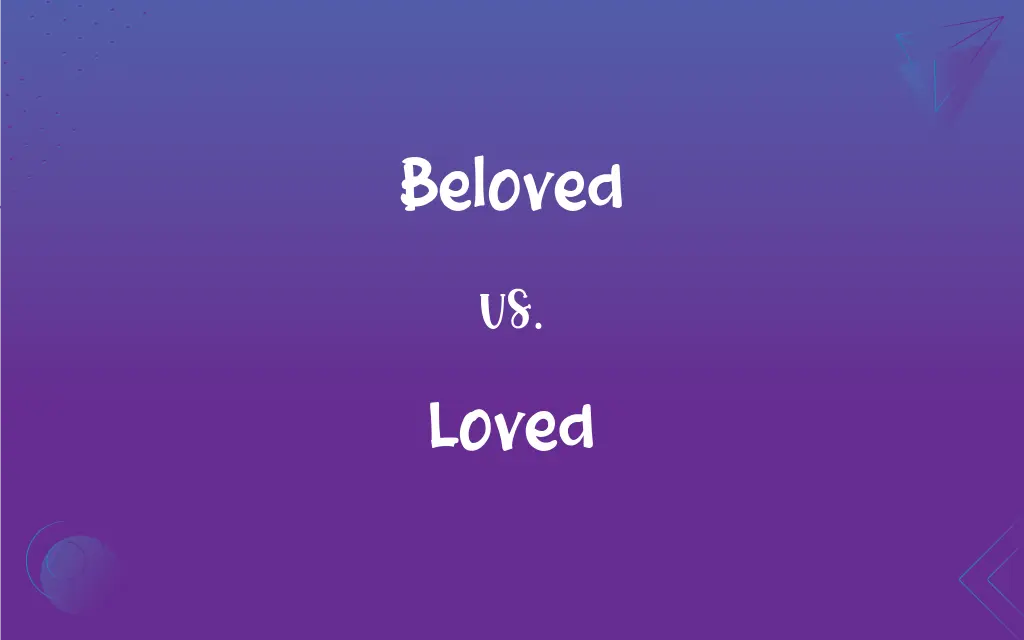Beloved vs. Loved: What's the Difference?
Edited by Aimie Carlson || By Janet White || Published on December 25, 2024
Beloved implies deep affection and a special, cherished status, while loved denotes a general feeling of love.

Key Differences
Beloved often conveys a sense of deep affection and special esteem, used for someone dearly loved, often in a romantic or familial context. Loved, on the other hand, is more general, indicating affection but without the depth or exclusivity implied by beloved.
Beloved suggests a deeper, more intimate emotional connection, typically reserved for a few special individuals or things. Loved can refer to a broader range of affectionate feelings, applicable to people, pets, objects, or concepts.
Beloved is more commonly used in literary or formal contexts, adding a layer of reverence or endearment. Loved is more versatile and casual, fitting into everyday speech and writing without the same level of intensity.
Historically, beloved has been associated with poetic and classical contexts, often found in literature and religious texts. Loved, meanwhile, is a more contemporary term, widely used and understood in modern language.
Beloved typically implies a choice or selection, indicating a special place in the heart or mind. Loved, while still meaningful, does not inherently carry this notion of exclusivity or preference.
ADVERTISEMENT
Comparison Chart
Emotional Intensity
Deep, intimate affection
General affection
Usage
Romantic, familial, formal
Broad, versatile, casual
Connotation
Special, cherished
Affectionate, caring
Cultural Context
Poetic, classical
Contemporary, everyday
Selectivity
Implies a special status
More inclusive
ADVERTISEMENT
Beloved and Loved Definitions
Beloved
Cherished.
The beloved family heirloom held generations of memories.
Loved
Favored.
His loved hobby brought him immense joy.
Beloved
Adored.
Her beloved pet always greeted her enthusiastically.
Loved
Appreciated.
Her loved advice was always sought after by friends.
Beloved
Highly Valued.
The beloved leader inspired his people profoundly.
Loved
Admired.
The loved teacher received praise from all her students.
Beloved
Endearingly Close.
The beloved book from her childhood was still her favorite.
Loved
Cared For.
The loved garden flourished under her attentive care.
Beloved
Deeply Loved.
His beloved daughter was the light of his life.
Loved
Treasured.
The loved photograph captured their happiest moment.
Beloved
Dearly loved.
Loved
A strong feeling of affection and concern toward another person, as that arising from kinship or close friendship.
Beloved
Much loved, dearly loved.
Loved
A feeling of devotion or adoration toward God or a god.
Beloved
Someone who is loved; something that is loved.
Beloved
(obsolete) belove.
Beloved
Greatly loved; dear to the heart.
Antony, so well beloved of Cæsar.
This is my beloved Son.
Beloved
One greatly loved.
My beloved is mine, and I am his.
Beloved
A beloved person; used as terms of endearment
Beloved
Dearly loved
FAQs
Is beloved only used for romantic contexts?
While common in romance, it's also used for familial or deeply cherished things.
What is the primary difference between beloved and loved?
Beloved implies a deeper, more special affection, while loved indicates a broader sense of affection.
Does beloved have historical significance in literature?
Yes, it's often found in classical literature and poetry, denoting deep affection.
Can I use beloved in a formal letter?
Yes, it's appropriate and adds a touch of reverence or endearment.
Can objects be described as beloved?
Yes, especially if they hold special sentimental value.
Does beloved suggest exclusivity?
Often, it implies a unique or special status in the heart or mind.
Does loved indicate a lasting affection?
It can, though it doesn't inherently imply the same depth as beloved.
Is beloved more associated with personal relationships?
Typically, yes, especially in romantic or close familial contexts.
Can beloved and loved be used interchangeably?
Not always, as beloved often conveys a deeper, more intimate emotion.
Is loved a more casual term?
Yes, loved is more versatile and casual, suitable for everyday use.
Is loved suitable for describing a general preference?
Yes, it can indicate a general liking or preference for something.
Is loved appropriate for expressing general affection?
Absolutely, it's suitable for expressing a wide range of affectionate feelings.
Can loved be used for people and things alike?
Yes, it's applicable to people, pets, objects, or concepts.
Is beloved a stronger expression than loved?
In many contexts, beloved implies a deeper emotional connection.
Can beloved be used in casual conversation?
It can, but it might sound more formal or intense than loved.
Is loved more commonly used in everyday language?
Yes, due to its broader and more general application.
Does beloved carry a poetic connotation?
Often, it's associated with a more poetic or classical tone.
Can beloved be used to describe a place?
Yes, especially if that place holds special sentimental value.
Can I say "my beloved" in a dedication?
Yes, it's a common and heartfelt way to address someone dearly loved.
Does beloved imply a longer or deeper relationship?
It often suggests a longer, deeply rooted affection or connection.
About Author
Written by
Janet WhiteJanet White has been an esteemed writer and blogger for Difference Wiki. Holding a Master's degree in Science and Medical Journalism from the prestigious Boston University, she has consistently demonstrated her expertise and passion for her field. When she's not immersed in her work, Janet relishes her time exercising, delving into a good book, and cherishing moments with friends and family.
Edited by
Aimie CarlsonAimie Carlson, holding a master's degree in English literature, is a fervent English language enthusiast. She lends her writing talents to Difference Wiki, a prominent website that specializes in comparisons, offering readers insightful analyses that both captivate and inform.





































































